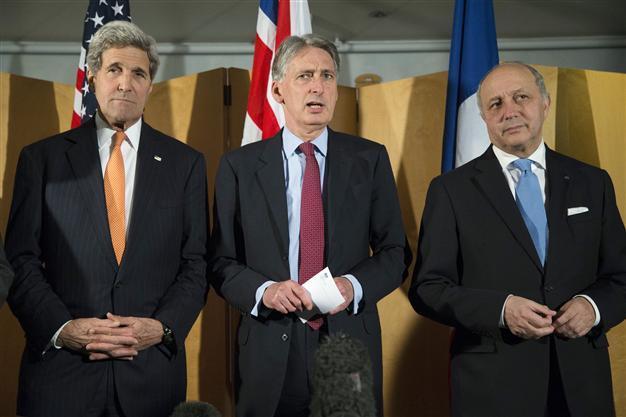UN sanctions emerge as possible Iran talks 'deal breaker'
LAUSANNE - Agence France-Presse

British Foreign Secretary Philip Hammond, center, flanked by U.S. Secretary of State John Kerry, left, and French Foreign Minister Laurent Fabius makes a statement about their meeting regarding recent negotiations with Iran over Iran's nuclear program in London, England, Saturday, March 21, 2015. AP Photo
On US Secretary of State John Kerry's Swiss bike rides last week to unwind from intense Iran nuclear talks, one emerging tricky issue may well have been going round his head: UN sanctions.
According to negotiators involved and experts, this has become a major snag as Iran and six major powers push for the outlines of a landmark deal by March 31 in marathon talks resuming in a few days.
And it is not just the powers and Iran not seeing eye to eye, there also appear to be divisions on the issue between the United States and France, which has long been wary of too soft a deal with Iran.
According to a European negotiator, supreme leader Ayatollah Ali Khamenei is putting "a lot of pressure" on his team to get "insulting" UN sanctions lifted "on day one" of any deal.
"They (the Iranians) say it is a deal breaker," the negotiator said in Lausanne during five days of talks which broke up on Friday.
After the Islamic Revolution, the US began in the 1980s imposing sanctions on Iran over human rights abuses and alleged support for "terrorism".
The United Nations became involved after concerns emerged in 2002-3 that Iran might be seeking nuclear weapons -- something it denies -- and began imposing sanctions on 2006.
These are focused primarily on preventing Iran getting hold of materials and technologies that might be used in its nuclear and missile programmes.
From 2010 unilateral sanctions from the US, European Union and others began strangling its oil exports and cutting its banks off from the global financial system.
Western officials say that they are only prepared to suspend -- but not terminate -- some of these EU and US measures if Iran agrees to shrink its nuclear programme, and in a phased manner.
"Given Tehran's indigenous (nuclear) knowledge, the group argues it (Iran) will not lose its leverage and could reinstate its programme ... rapidly," an International Crisis Group analysis said.
So US officials say this will be tied to "milestones", some of which -- like dismantling certain nuclear facilities -- would take time to implement and verify.
With Republican concerns about the mooted deal making for a highly charged political situation in Washington, it may for difficult for President Barack Obama to suspend that many US sanctions.
But within six months to a year, the European official said, this suspension of US and EU sanctions would be enough to provide Iran with "huge relief".
However, and even though they cause much less economic pain than the unilateral sanctions, Iran is also insisting on getting the UN ones lifted, seeing them as illegal and degrading.
But even a suspension of the UN sanctions is difficult because they are based on the UN atomic watchdog saying it is unable to guarantee that Iran's nuclear programme is entirely peaceful.
Getting a clean bill of health from the International Atomic Energy Agency in Vienna might take "years," the European diplomat said.
This is in part because an IAEA probe is stalled into suspected Iranian nuclear weapons research work, mostly before 2003 -- the infamous "PMD" (possible military dimensions) file.
"Lifting UN sanctions too early risks legitimising Iran's nuclear programme while there are still outstanding concerns about ... its past activities," Arms Control Association expert Kelsey Davenport told AFP.
France, a veto-wielding permanent member of the Security Council, is seen as being strictly opposed to lifting UN sanctions beyond some minor, periphery measures.
Hawkish Foreign Minister Laurent Fabius even phoned his team in Lausanne to tell them not to budge, the European diplomat said.
US officials say they are looking at a possible phased suspension, with the proviso that they could be "snapped back" quickly -- and possibly without the need for a full Security Council vote.
"Negotiators will need to find a creative way to square the circle. A new (UN) resolution endorsing the deal, but leaving in place some restrictions might be a way to close the gap," Davenport said.
